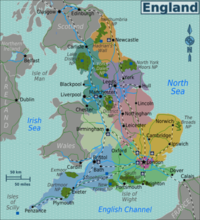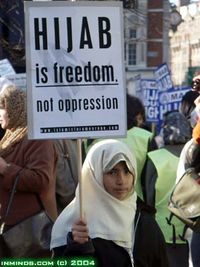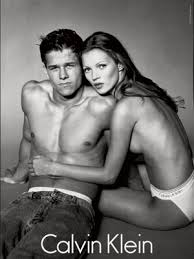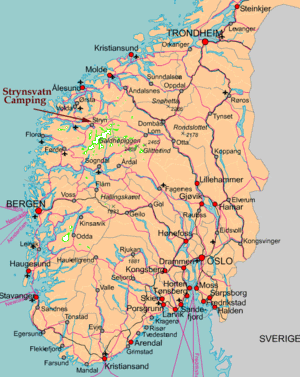Think of this as Volume 17, Number 35 of the newsletter I have written weekly since March, 1997. Enjoy.

because I was having my first long vacation in three years.
I traveled with my daughter, who writes
for us on Urban Wildlife Policy. We did a 10-day cruise of
Norway, then spent a week in northern England, mainly based in
Sheffield. (Go Wednesday.)
I learned a whole lot. And the most
important lesson is this.
Morality is totally objective.
The best way to illustrate this is with
our visit to England. We're supposed to be a lot like England.
They're our best friends. We can understand them when they speak,
sometimes.
But on questions of morality, it turns
out we're not like them at all.

The British don't want to see it. They
really don't want to see it. Not only was the Prime Minister pushed
as we arrived in Europe to, in effect, try and ban sex from the
Internet (not that he could if he wanted to), but a large group of
women are pressing shops to stop stocking “lad's mags” – the
local equivalent of Playboy, on grounds of morality.
It turns out to be an interesting
alliance, between radical feminists of the Andrea Dworkin school and,
behind them, the country's growing Muslim minority. The feminists are
on the front line because they're legitimate, as a political force.
But the electoral force for this is Muslim, no doubt.
That's because Christianity of all
sorts is a spent political force in England, as it is in many places
in Europe, owing in large part to the various scandals surrounding
the Roman Catholic Church. Meanwhile Islam – even relatively
“moderate” Islam as practiced by a gentleman I met on our cruise
– is radically anti-feminist, radically anti-woman.

slice of the world's population, sorry to say, simply don't see women
as people. They see them as chattal, even while they're claiming to
“protect” them and even while honoring them by claiming that all
of us – men as well as women – will take out mothers' names when
we die. Supposedly, women run the home in Islamic culture, but that's
the same as saying gangs run the prisons. They're still in prison.
And the Reformation has not yet taken place – it's still the 15th
century, and running on the equivalent of a Julian calendar.
I'm not an Islamaphobe per-se, but this
vacation really opened my eyes on some things. You think Muslim women
aren't raped, by Muslims? You think they're safe, in their bodies,
from physical attack? They're not. In many Muslim cultures the
clitorises of 8 year girls are violently ripped out so they will
never enjoy the physical act – so it will always be rape, an act
engaged in purely for the pleasure of Muslim mens' pricks. And the
fact that the great mysteries of sex are hidden from the culture,
whether in Britain or Saudi Arabian media, doesn't change that fact.
It emphasizes it. Evil needs dark places to hide in, and Islam
creates them. In abundance.

virtual home of sex. We've had that argument. It's over. Whatever
your taste, just shut the door and we're good. You're a good citizen,
no matter how your heart moves. We have our dark spots – and
privacy can be a dark spot – but they're limited. They're not in
the media.
On the other hand, Americans are
incredibly rigid about gambling. Especially sports gambling. We
believe it corrupts our athletes, and our teams. It's legal in
Nevada, but efforts to make it legal elsewhere, online or off, are
met with a wall that an climb through even your Internet connections,
grab you by the throat, and put your ass in jail faster than you can
say four-game parlay.
In England, there's gambling on every
street corner. Shops making book are everywhere, the online bookies
advertise on TV, and the names of bookie shops or online casinos
grace the shirts of football stars in every league.
This despite the fact that “high streets” (that's downtown to
y'all) across the country usually have loan sharks or “payday loan”
companies right next to the betting shops. The payday lenders, like
Wonga, are also shirt sponsors.

of tobacco smoke. Technically, the authorities are cracking down –
you're not supposed to smoke indoors, even in pubs – but they just
go outside the door and the smoke drifts inside easily. My last day
in England I went with a long-time friend to a lovely Turkish
restaurant near her house, and watched an aged woman go through a
half-pack of fags at a table right outside the door. I didn't get
much sleep during my trip, because that's how second-hand smoke
effects me. It puts my wife's lights out, and those of my daughter,
so she crashed out for 10 hours each day on our travels, and often
added a one-hour nap.
As to alcohol, they apparently tax it
more heavily than we do, but they're more casual about drinking than
we are, and the enforcement of underage drinking laws appears more
lax, although they're on the books. To me, seeing a drunk,
cig-addicted gambling addict at the loan sharks' is a lot more
appalling than seeing some titties on my Internet connection. But
that's not how the English see it.
I'm not saying we're better here. I'm
not saying they are. All I'm saying is that we're different. We all
speak of morality as a set of absolutes, but they're not absolute.
Not at all. They're relative, changing radically from place-to-place,
different everywhere.
Just let's not pretend they're absolutes,
OK? They're preferences. Morality should be a private matter, not a
public one, no matter how you view things. When you try to impose
your morality on me – any morality – you're seeking to oppress
me, to limit my freedom to decide these things for myself. You're
imposing a subjective set of standards on others and calling them
absolutes.
You are, in English terms, a wanker.










interesting points you make about the social climate on those places. Looking forward hearing your thoughts on the U.S. reforms towards sports betting and gambling as a whole. A lot of U.S. moving towards sports betting regulation and more and more resources openly available for any local operators looking on how to become sports bookies. It will be interesting to see how the landscape shapes up to be in a couple of years from now.
interesting points you make about the social climate on those places. Looking forward hearing your thoughts on the U.S. reforms towards sports betting and gambling as a whole. A lot of U.S. moving towards sports betting regulation and more and more resources openly available for any local operators looking on how to become sports bookies. It will be interesting to see how the landscape shapes up to be in a couple of years from now.